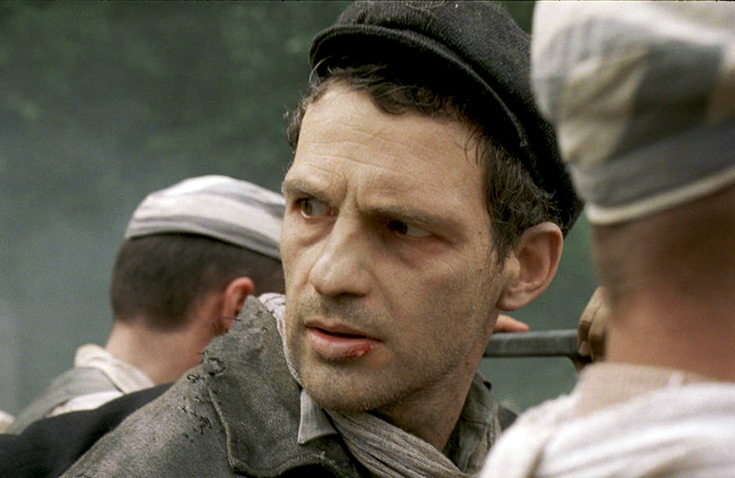 This is a reprint of our review from the 2015 Cannes Film Festival.
This is a reprint of our review from the 2015 Cannes Film Festival.
Depicting the Holocaust on screen has always been a prickly matter. For many years, it was shied away from entirely, with some arguing, perhaps correctly, that cinema was incapable of capturing the true horror of the most evil, repulsive acts that human beings have inflicted on each other.
Over time, filmmakers became more confident in attempting it: sometimes sensitively and successfully ("The Pawnbroker," "Schindler’s List," obviously "Shoah"), sometimes in ways that felt crass and exploitative ("Life Is Beautiful"). At this point, not one but two installments of a superhero franchise have featured scenes set in concentration camps. "Son Of Saul," the first feature from Hungarian director László Nemes, and the rare first feature to premiere In Competition at Cannes, is a much more serious attempt at portraying the Holocaust, and though a few elements of its construction might be questionable, it’s mostly a powerful, thoughtful, and visually striking picture.

The film centers, quite literally, on the titular Saul (Géza Röhrig), a Hungarian prisoner in an unnamed concentration camp. Saul is a Sonderkommando, who aids the Nazi guards in herding other Jewish captives into the gas chambers, burning their bodies and similar duties under threat of death.
One day, Saul sees a young boy pulled out of the chamber, only to be killed by a German. He thinks — no, is sure — that the boy is his own son, and sets out to obtain the body before it’s incinerated, find a rabbi, and give the child a proper burial. But some of his fellow Sonderkommandos have been secretly gathering weapons and planning an uprising, and plan to strike at dawn, and Saul’s loyalties become sharply divided.

The best way to describe the look of "Son Of Saul" is probably "immediate." The almost-real-time action is played out in Academy ratio, and, with a color palette that belies that Nemes trained at Bela Tarr‘s film school, it’s shot (in 35mm) in long hand-held takes with its title character almost always at the focus of a very shallow-focus frame. It’s a very different kind of aesthetic, if aesthetic isn’t the wrong word, for a film like this, drawing from the same inspiration that Emmanuel Lubezki did in the combat sequences in "Children Of Men."
It’s a very ambitious move for a first-time filmmaker, but it pays off. The film has a visceral, experiential quality that captures both the mundane horror of Saul’s day-to-day duties in the early part of the film, and the Goya-esque hell as chaos erupts later on. The movement and blocking are minutely and meticulously choreographed, and the shallow focus and astonishing sound design mean that we only see glimpses or hear hints of the very worst terrors. It’s a bold attempt to find a new visual language for a film like this, and is very effective for it, depriving the audience of any distance, or reprieve, or any sense of payback once the uprising begins.

The film also functions as a thriller to some degree, as Saul (and it should be said here that Röhrig is remarkable throughout) searches the camp for both a rabbi and the tools that his comrades need to spark off their revolt. It puts morality at the center of the film: Should the Sonderkommandos be damned as collaborators? Is Saul’s quest to bury his son a selfish act? Does any of it matter in the context of the monstrous acts around them? These are all tough questions, and to his credit, Nemes has no interest in finding easy answers for them.
What isn’t clear is how deliberate the questions raised by the film’s form are. For all of its visceral quality, the over-the-shoulder perspective, and concentration-camp-tour construction of the screenplay, it’s queasily reminiscent of a "Call Of Duty"-style video game. Is the use of showy long takes and thriller-like plotting less exploitative than using more traditional dramatic devices to confront the horrors of the Holocaust, or more? At a time when concentration camps feature in "X-Men" movies, does it even matter?

Thirty-six hours on, I’m not sure I have the answers to these questions, and it’s something that’s sure to be debated as more audiences get the chance to see "Son of Saul." Regardless of where they end up, however, they’ll be confronted with an enormously technically accomplished debut from a confident new voice, one that carries impressive moral heft and enormous power, even if you may be left feeling a little uneasy because of its form, as well as its content. [B+]

